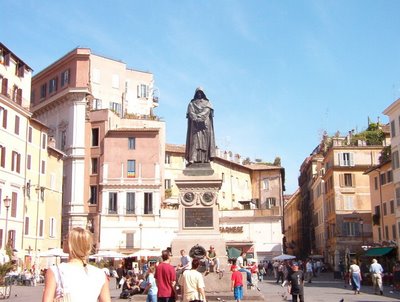
Ο θάνατος του Giordano Bruno (1548 – 1600) σημαδεύει το τέλος της πιο ερωτικής εποχής της Φιλοσοφίας. Ήταν η μαγική εποχή που o Bruno με άλλους στοχαστές ονειρεύτηκαν, ότι ο άνθρωπος θα εξαρθεί πάνω από τον θάνατο, την φθορά και τη δυστυχία· ότι θα μπορούσε να ευτυχίσει εδώ, πάνω στη γη. Δεν υπάρχει επιτύμβιο γιατί δεν θάφτηκε αλλά κάηκε στην πυρά, στο Campo de' Fiori στη Ρώμη. Για επιτύμβιο θα διάλεγα αυτό που έγραψε γι’ αυτούς τους διανοητές ο Georg Hegel:
"Sie fuehlten sich und wurden nun von dem Triebe regiert, aus sich heraus das Wesen zu schaffen, die Wahrheit zu schoefen, - Menschen gaerender und brausender Natur, von unstetem und wildem Charakter, enthusiastischem Wesen, das nicht die Ruhe der Wissenschaft gewinnen konnte. Man findet so bei ihnen grosse Originalitaet; der Inhalt ist aber hoechst vermischt und ungleich. In dieser Zeit finden sich eine Menge Individuen, gross durch die Energie ihres Geistes, ihres Charakters, bei denen sich aber eine grosse Verworrenheit des Geistes und Charakters zugleich findet, - deren Schicksale, wie ihre Schriften, nur diese Unsicherheit ihres Wesens und die Empoerung des Innern gegen das vorhandene Dasein wie Intelligenz und die Sucht, heraus zur Festigkeit zu gebaeren, bezeichnen und in denen ein heisser Trieb zum Tiefsten und Konkreten in denkender Weise durch unendliche Phantastereien, Wildheit der Einbildung, Sucht nach geheimen astrologischen, geomantischen und anderen Kenntnissen verunreinigt war.“
"Οι άντρες αυτοί ένοιωθαν ότι μια παρορμητική δύναμη τους ωθούσε να αντλήσουν την Αλήθεια από μέσα τους γνωρίζοντας έτσι την Ουσία της Ζωής. Ήταν άντρες με φλογερό, θυελλώδη κι ανήσυχο χαρακτήρα. Άντρες με ενθουσιώδη ψυχοσύνθεση, που δεν μπορούσαν να επαναπαυτούν στην ηρεμία που δίνει η Γνώση. Αν και κανένας δεν αρνείται ότι είχαν μία θαυμαστή ενόραση για το τι ήταν σπουδαίο και αληθινό, δεν υπάρχει καμία αμφιβολία όμως ότι ήσαν γλεντοκόποι σε ότι εκχυδάιζε το λογικό και την καρδιά τους· το έδειχναν ακόμα και στην εξωτερική τους ζωή. Κρύβαν μέσα τους αυτούσια αυθεντικότητα και πνευματική δύναμη. Κι όμως ταυτόχρονα ήσαν αμφίσημοι, αμφιλεγόμενοι και συγχυτικοί. Η μοίρα τους, οι ζωές τους, τα γραπτά τους – που συχνά γεμίζουν τόμους ολόκληρους – δείχνουν την ατίθαση Ουσία τους. Μια Ουσία κατακερματισμένη που εξεγείρεται ενάντια στην Ύπαρξη τους·. Λαχταρούν έτσι να εξαρθούν πάνω από τον εαυτό τους και να αγγίξουν την βεβαιότητα, το Ένα."
Πηγή: Vorlesungen ueber die Geschichte der Philosophie, G.W.F. Hegel, Werke in 20 Baenden, Band 20, Seite 18.
Σχόλια
Δημοσίευση σχολίου